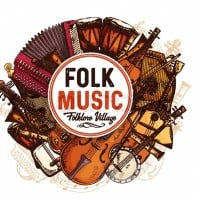Top 10 Genres that Helped in the Development of Guitar
These genres are the most important genres for development of guitar. This doesn't mean they are best at guitar. Its simply most important. Rock music is a music genre that was created in the 1940s. The genre was popular during the 60s, 70s, 80s, 90s and 2000s. Rock bands generally consists of a guitar player, a drummer, bass player and singer. There are many rock subgenres - such as heavy metal, alternative, hard rock, grunge, and more... read more
Rock music is a music genre that was created in the 1940s. The genre was popular during the 60s, 70s, 80s, 90s and 2000s. Rock bands generally consists of a guitar player, a drummer, bass player and singer. There are many rock subgenres - such as heavy metal, alternative, hard rock, grunge, and more... read more Rock is a pivotal genre for distorted music on guitar. As distortion technology progressed, so did rock music. Rock guitarists experimented with various types of tube distortion and were instrumental in the fusion of different musical genres. Rock also popularized many guitar techniques and rock guitarists are often seen as the most charismatic.
It's true that guitars were never the same after rock came around. They live in fear of rock from all the casualties.
 Jazz is a music genre that originated in the African-American communities of New Orleans, United States, in the late 19th and early 20th centuries, and developed from roots in blues and ragtime. Jazz is seen by many as "America's classical music".
Jazz is a music genre that originated in the African-American communities of New Orleans, United States, in the late 19th and early 20th centuries, and developed from roots in blues and ragtime. Jazz is seen by many as "America's classical music". Jazz is the most important genre for the development of the guitar. Jazz evolved from blues but with more technical proficiency. It originated at a time when only acoustic guitars were available. Since then, guitarists have continually experimented with their instruments, contributing to the development of the electric guitar as well.
Jazz popularized techniques such as sweep picking, alternate picking, and tapping. Jazz guitarists experimented with distorted sounds and were pioneers in both lead and rhythm guitar. They also introduced complex ascending and descending patterns. Therefore, I believe jazz deserves the number one spot. However, when we talk about jazz, many think of it as boring music.
 Blues is a music genre and musical form originated by African Americans in the Deep South of the United States around the end of the 19th century.
Blues is a music genre and musical form originated by African Americans in the Deep South of the United States around the end of the 19th century. Blues has had a significant impact on guitar, especially influencing rock. Blues musicians developed their unique styles, evolving from traditional music. This genre was also pivotal in popularizing the electric guitar, with some of the earliest records of distorted guitar found in blues. Additionally, blues popularized techniques like strumming and harmonics and introduced a distinctive scale.

Classical music also contributed significantly to the development of the guitar, mostly in technical ways. However, it did not become as famous as blues because classical guitar was considered difficult to play, leading most guitarists to choose blues instead.
Classical was largely ignored by rock musicians, though not by pianists. It started to gain popularity when guitarists like Steve Hackett, Ritchie Blackmore, Uli Jon Roth, and Steve Howe incorporated classical elements into rock.
 Punk rock is a subgenre of rock music. It usually has rebellious lyrics and down stroked power chords played on guitars. Bad Religion, Sex Pistols, and Green Day (actually pop-punk, which is still punk in a way) are a few punk rock bands. The subgenre influenced thrash metal because of it's down stroked... read more
Punk rock is a subgenre of rock music. It usually has rebellious lyrics and down stroked power chords played on guitars. Bad Religion, Sex Pistols, and Green Day (actually pop-punk, which is still punk in a way) are a few punk rock bands. The subgenre influenced thrash metal because of it's down stroked... read more Punk had its own importance for rhythm guitar. It helped in the development of highly distorted music and non-technical rhythmic sound, which later inspired Thrash Metal, Death Metal, Black Metal, alternative rock, new wave, and others.
 Heavy Metal music is a sub-genre of rock music that originated in the late 1960s-70s, featuring more distorted and heavier instrumental work and darker lyrical themes. Heavy Metal broke into mainstream success with bands such as Black Sabbath, Iron Maiden and Metallica... read more
Heavy Metal music is a sub-genre of rock music that originated in the late 1960s-70s, featuring more distorted and heavier instrumental work and darker lyrical themes. Heavy Metal broke into mainstream success with bands such as Black Sabbath, Iron Maiden and Metallica... read more I ranked metal quite low on this list because the title is about genres that helped in the development of the guitar. Metal is a more recent genre, not as old as blues, rock, jazz, or classical. It evolved from various genres and has influenced guitar playing in many ways, including shredding, fast playing, heavy rhythms, and technical precision.

Folk had a significant impact on guitar, especially for soft music. Folk is also one of the earliest genres of music. I don't know much about old musical scales, but people back then used many different types of guitars.

Country made an impact on genres like blues, rock, jazz, and others.
Mostly with different types of playing.
 Psychedelic Rock is a style of rock music in the late 1960s where it is incorporated, influenced or inspired by psychedelic culture which revolves around the perception of hallucinogenic drugs. It is incorporated with improvisation, electronic sound effects and extended solos.
Psychedelic Rock is a style of rock music in the late 1960s where it is incorporated, influenced or inspired by psychedelic culture which revolves around the perception of hallucinogenic drugs. It is incorporated with improvisation, electronic sound effects and extended solos. Psychedelic rock helped in the development of distortion guitar, especially with the proper equipment. Before that, people sometimes used to break their amps to create distortion.